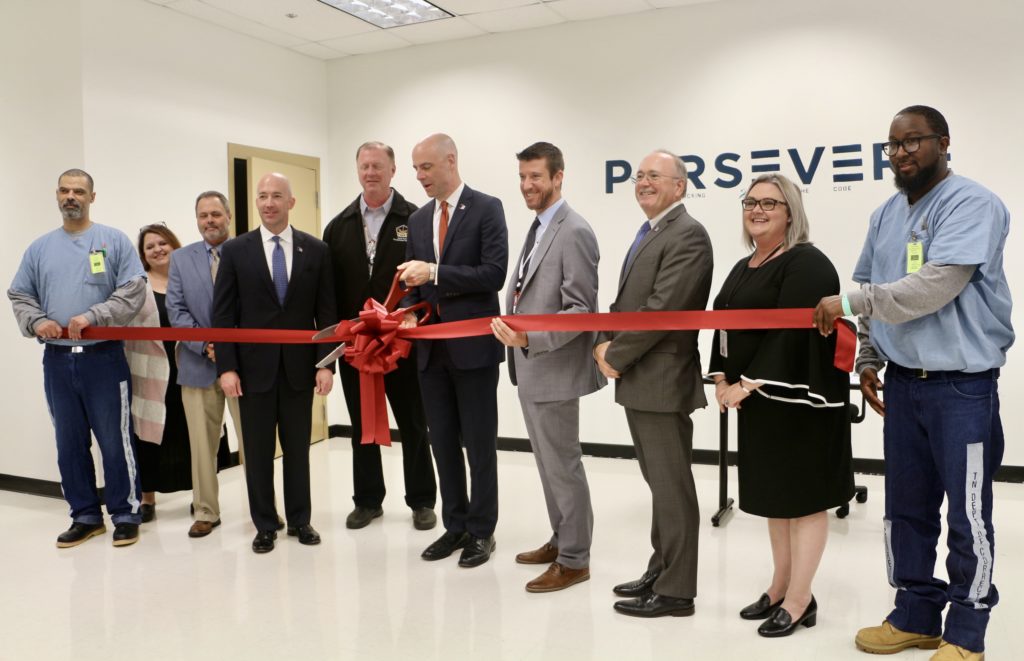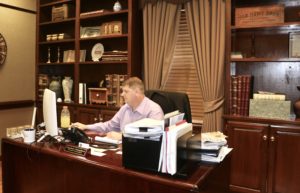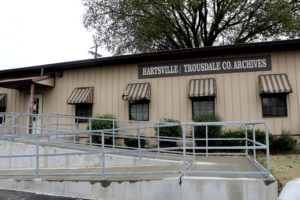
Exactly four years ago, a struggling town in Middle Tennessee became home to the largest prison in the state. Since then, the private facility owned by CoreCivic has been plagued by chronic staffing shortages and unsafe conditions.
In short, the prison hasn’t turned out exactly as local officials hoped. But many still say the benefits outweigh the challenges.
More: A Year After State Audit, Lawmakers Question Whether A Middle Tennessee Prison Has Improved
Fluorescent lights hummed in a cluttered storage room as John Oliver combed through binders and boxes, relics from the small town he’s called home for 50 years.
 Samantha Max WPLN
Samantha Max WPLNTrousdale County historian John Oliver leafs through old photos in the town archives. Samantha Max / WPLN News
“This is an account book — look at this — from people buying stuff in 1819 from a store in Hartsville,” Oliver said, flipping through the yellowed pages. “Isn’t this incredible?”
Oliver is the Trousdale County historian and unofficial expert on this town of 11,000 people about 50 miles northeast of Nashville. For decades, he said, the town’s economy was stuck in a rut.
“Our biggest source of income was just property tax and retail tax, because we had no industry. It had all gone and left,” he said.
Oliver remembers when the Tennessee Valley Authority bought a 2,000-acre plot of land in the 1960s to build a nuclear plant. And he remembers when the utility abandoned the site in 1984, leaving behind one lone cooling tower in an otherwise vacant industrial park.
 Samantha Max WPLN
Samantha Max WPLNA single cooling tower from an abandoned Tennessee Valley Authority nuclear plant looms above the Trousdale Turner Correctional Facility in Hartsville. Samantha Max / WPLN News
“When CCA came in, called CoreCivic now, and said, ‘We want to put a prison in,’ it was a different ball game,” Oliver said.
That was about 13 years ago, when the Brentwood-based private prison company first approached the county. Oliver was on the county commission during the negotiations, and he said local representatives fielded plenty of complaints from fellow residents.
“I told my constituents, I said, ‘Yeah, I’d rather have a ping pong ball manufacturing plant there. Anything other than a prison,” Oliver said. “But we don’t have that option. We really don’t have that option.'”
County Mayor Stephen Chambers was one of the naysayers. A former criminal defense attorney, Chambers said he would rather see fewer people behind bars, not more. Plus, he worried building a prison in the town’s industrial park would make it even more difficult to bring new businesses to town.
“Be honest with you, I didn’t want the prison,” he said in his office in downtown Hartsville. “But it’s here now. You gotta deal with it.”
 Samantha Max WPLN
Samantha Max WPLNHartsville-Trousdale County Mayor Stephen Chambers says the private prison in his hometown is “a dollar and cents issue.” Samantha Max / WPLN News
Chambers wasn’t yet in office when the Trousdale Turner Correctional Center opened in January 2016. But CoreCivic made big promises to his predecessors: hundreds of jobs, much-needed tax revenue.
In a 2013 letter to then-commissioner of the Tennessee Department of Correction, Derrick Schofield, the mayor at the time urged Schofield to allow CoreCivic to build a prison in Trousdale County.
“The significant benefits to our community cannot be understated,” former Mayor Jakie West wrote. “With a full-time employment of more than 300 employees, the $8-10 million payroll will turn over multiple times in our community, and the estimated $1.5 million in property taxes and estimated $1.8 [million in] utility payments will provide much needed resources to our area.”
Benefits Vs. Costs
With a capacity of more than 2,500 inmates, the Trousdale Turner Correctional Center is the newest and largest penitentiary in the state. And on the surface, the prison has followed through. It brought 435 jobs — more than any other company in town. CoreCivic also pays more than $1.5 million in property taxes each year and is a frequent donor to local charities.
But the private prison company’s relationship with Trousdale County has been complicated.
The Trousdale Turner Correctional Center also quickly became one of the most notorious prisons in Tennessee. The state fined CoreCivic more than $2 million after a 2017 audit found the prison was severely understaffed, according to the Hartsville Vidette.
Now, the prison is caught in a vicious cycle. Without enough employees to monitor security, disturbing stories have trickled out of the prison — reports of gang activity, inmates assaulting employees, homicides and suicides — which makes it even harder to fill jobs.
“A lot of people that maybe have family members there, or know people that work there, or something that, just have concerns about how it operates. And that’s been a continuing thing that I’ve heard off and on,” Chambers said.
Chambers said many locals applied for positions when the prison opened but quit soon after, opting for less stressful jobs in neighboring areas.
“Other businesses or companies opening up in the surrounding counties pay more. Then you don’t have to deal with that environment,” he said. “I think that’s been a real draw on their employment.”
 Chas Sisk WPLN
Chas Sisk WPLNDemonstrators blockaded the entrances to CoreCivic’s then headquarters in Nashville for about eight hours during a 2018 protest criticizing the private correctional company’s ties to federal immigration enforcement. Chas Sisk / WPLN News
‘Benefits Are Almost Never What Is Promised’
Researcher Jack Norton of the Vera Institute, which advocates against mass incarceration, said locals in small towns rarely find prison jobs appealing.
“Not everybody wants them,” he said. “They might not pay well. They’re also very stressful, very violent jobs.”
Research from Pew shows this struggle to staff new prisons is common across the U.S., as more than 1,000 prisons have been built nationwide in the past 50 years, mostly in rural areas like Trousdale County.
Time and again, government agencies and private prison companies have courted small communities where bygone industries no longer pay the bills.
“It wasn’t like anybody was investing in, sort of, real social infrastructure that would help, sort of, promote life and wellbeing,” Norton said. “What was on offer for these struggling rural towns was incarceration and the jobs that came with that.”
But Norton and other researchers have found that prisons rarely do much to boost the local economy. Studies have found that prisons don’t typically bring long-term benefits, like higher per capita incomes or lower unemployment rates. The biggest bump, Norton said, typically goes to the local gas stations and lunch spots.
 Samantha Max WPLN
Samantha Max WPLNThe Hartsville-Trousdale County government offices are across the street from a Sonic Drive-In, one of the few restaurants in town. Samantha Max / WPLN News
“The pool of people that stands to benefit from it is very small,” Norton said. “And those benefits are almost never what is promised or imagined.”
Like those hundreds of staff positions CoreCivic promised. They did come. But a CoreCivic spokeswoman tells WPLN News that only 18% of employees actually live in Trousdale County, where the prison is located. The rest commute from elsewhere.
The Town’s ‘Savior’
Still, the pros outweigh the cons for Natalie Knudsen, the executive director of the Hartsville-Trousdale County Chamber of Commerce. She said people hear stories about incidents in the prison from time to time, but they generally don’t worry too much about it.
“I mean, we’re practical, we’re agricultural folks. They don’t put really, really nice, play-by-the-rules people in prison, right?” Knuden said. “We hope that it runs well. And we like to avoid controversy for our own sake in this town. But most of us realize, it is what it is.”
For its part, CoreCivic said it’s working diligently to recruit employees in Middle Tennessee’s tight labor market. Trousdale Turner now offers the highest starting salary for correctional officers of any prison in the state. At last count, there were still almost 80 vacancies, but the company said the turnover rate has decreased by almost a quarter since the state audit.
 Despite all the complications, John Oliver calls the prison the town’s ‘savior.’
Despite all the complications, John Oliver calls the prison the town’s ‘savior.’
“Small rural counties hurt for income, and we have to depend on property tax. Industry is good if you can get it. But these counties that are so far away, it’s hard for them to have industry,” Oliver said as he leaned forward in an armchair in the county archives.
“So this, in our point of view, has solved a problem. We lost all of our industry. And so, in that way, it’s been a blessing.”
Oliver has his reservations about the prison. But as long as it continues to contribute to the local economy, he said, “I’m 100% for it.”
Samantha Max is a Report for America corps member.

